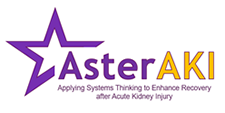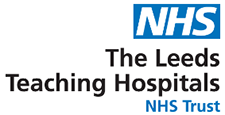Acute kidney injury (AKI) is a sudden dysfunction of the kidneys and a major marker of patient safety. The AsterAKI study aims to understand and identify improvements to the quality of post-discharge care for people affected by AKI.
This is an NIHR Health and Social Care Delivery Research (HSDR) funded study and is a collaboration between the Universities of Manchester, Leeds, Aberdeen, Nottingham and Southampton, NHS Education for Scotland, and Leeds Teaching Hospitals NHS Trust.
The planned study entails three work packages focused on identifying, understanding and targeting variation in post-discharge care for people affected by AKI.

What is acute kidney injury (AKI)?
Kidneys are essential for our health, but generally our awareness and understanding of their role has been low. The kidneys have a number of vital roles, including filtering our blood and getting rid of waste and excess water by converting it into urine.
Acute kidney injury (AKI) refers to a circumstance when the kidneys suddenly stop working properly within hours or a few days. There are many reasons why this can happen. The most common cause is when our body becomes short of salt and water during an illness, such as when people become dehydrated from diarrhoea and vomiting.
AKI is common, harmful and costly. It affects 1 in 7 people admitted to hospital unexpectedly. It is more common among people who are frail or who live with multiple health problems such as diabetes and heart failure.
We have shown that AKI remains an important and overlooked health problem for people even after they recover and go home from hospital: 1 in 5 people will need to be admitted to hospital again as an emergency within a month, and 1 in 3 people within three months.
Recognising AKI as a major marker of patient safety, we want to help improve the quality of post-discharge care for people with AKI through our three work packages.
About the study
We have already used robust research methods to develop national standards to improve care for people affected by AKI.
These include:
- helping people understand how to keep their kidneys healthy when they become unwell;
- supporting people with their medicines, such as restarting important drugs for people with heart failure;
- ensuring a timely review by a clinician;
- carrying out tests at the right time to ensure that we are quick to identify people with recurrent or lasting kidney problems.
In partnership with patients, carers and professionals, the AsterAKI study aims to:
- strengthen national guidelines;
- help improve resources that support person-centred care;
- develop reliable ways of measuring high-quality care for people leaving hospital after AKI;
- guide quality improvement across the health service.
The study is made up of three linked pieces of work. These work packages will identify, understand and target variations in the care for people affected by AKI after they are discharged from hospital.
We will:
- hold a series of workshops with patient and professional representatives;
- discuss findings from WP1 and WP2;
- develop practical recommendations to improve the quality of post-discharge care.
Work Package 1 (WP1)
This will use the Clinical Practice Research Datalink (CPRD) to identify and examine variations in care for people leaving hospital following AKI. We will:
- check whether care is being delivered according to national standards;
- try to work out why care sometimes fails to meet these standards;
- identify areas where we can improve future care.

Work Package 2 (WP2)
This involves developing case studies across four care systems in England to understand variations in post-discharge care.
We will:
- interview patients and carers to learn from their experiences of care following AKI;
- interview other people involved in a patient’s care, such as their GP, nurse, pharmacist or member of hospital staff.

Work Package 3 (WP3)
This involves a series of workshops to explore variations in care.
We will:
- hold a series of workshops with patient and professional representatives;
- discuss findings from WP1 and WP2;
- develop practical recommendations to improve the quality of post-discharge care.

Information for healthcare professionals and researchers
- Acute Kidney Injury toolkit – Post-AKI Care: Primary care management after an episode of AKI
- Guidance on The Timeliness of Post-Discharge Care for Adults Following Acute Kidney Injury (PDF)
- Post-Discharge Care for Adults Following Acute Kidney Injury (PDF)
- Think Kidneys campaign with information for the public and healthcare professionals
- AsterAKI summary and abstract (NIHR)
- Acute kidney injury: A lens to improve patient safety across the NHS? (GM PSTRC blog)
- Acute kidney injury toolkit (RCGP)
- Think Kidneys campaign: Aims and aspirations (YouTube)
Our team
The AsterAKI team comprises researchers drawn from our partner institutions.
Through the establishment of a Kidney Patient Involvement Network working group, the UK Standards for Public Involvement will provide a structure to ensure patient voice and experience are central to all stages of the study.
Tom Blakeman (Chief Investigator)
 GP and Clinical Senior Lecturer in Primary Care
GP and Clinical Senior Lecturer in Primary Care
Tom is a GP in Leeds and Clinical Senior Lecturer at the Centre for Primary Care and Health Services Research at The University of Manchester.
He is a member of the NIHR Greater Manchester Patient Safety Translational Research Centre.
Between 2014 and 2017, he was a member of the NHS England Think Kidneys Programme Board, co-leading the development of Think Kidneys guidance and resources for primary care.
Between 2017 and 2020, he was member of the Royal College of General Practitioners’ Clinical Champion for Acute Kidney Injury (2014-2020), leading the development of the RCGP AKI Toolkit and guidance to improve post-discharge care following AKI.
Robbie Foy (Co-Principal Investigator)
 Professor in Primary Care
Professor in Primary Care
Robbie Foy is Professor of Primary Care at the Leeds Institute of Health Sciences and a GP in Leeds.
His field of work, implementation research, aims to inform policy decisions about how best to use resources to improve the uptake of research findings by evaluating approaches to change professional and organisational behaviour.
Darren Ashcroft (Co-Investigator)
 Professor of Pharmacoepidemiology
Professor of Pharmacoepidemiology
Darren is the Director of the National Institute for Health Research (NIHR) Greater Manchester Patient Safety Translational Research Centre (GM PSTRC), and an Honorary Professor at the Northern Care Alliance NHS Foundation Trust and the University of Hong Kong.
He leads Work Package 1 of the AsterAKI study, which focuses on examining patterns and variations in the delivery of post-discharge AKI care using linked electronic health records. The findings will:
- help to explain variations in adherence to care indicators between practices;
- inform qualitative interviews to help identify modifiable factors affecting implementation and vulnerable groups of people disproportionately affected by the COVID-19 pandemic;
- inform participatory workshops by demonstrating post-discharge AKI care quality indicators that can be widely harvested from routine electronic health record data to monitor and drive quality improvement.
Simon Fraser (Co-Investigator)
 Associate Professor of Public Health
Associate Professor of Public Health
As a public health doctor building on his past experience as a GP, Simon’s research aims to understand and address the determinants, burden, inequalities and adverse outcomes associated with chronic disease. He has a particular interest in kidney disease.
Duncan McNab (Co-Investigator)
 Assistant GP Director
Assistant GP Director
Duncan is a GP and a GP Assistant Director for Patient Safety and Quality Improvement at NHS Education for Scotland. He develops and evaluates quality improvement and patient safety educational resources for frontline healthcare teams.
Previously, Duncan worked as the clinical lead for patient safety in primary care in Ayrshire and Arran.
Duncan has an interest in Human Factors, especially in optimising work within complex work systems.
He completed his PhD at Glasgow University, where he explored how safety was created within primary care interdisciplinary work systems.
Duncan has published research in many areas of safety and improvement with a particular focus of the adoption of systems thinking approaches.
Holly Loughton (Co-Investigator)
 Holly Loughton is the Patient Involvement Facilitator for the Kidney Patient Involvement Network (KPIN).
Holly Loughton is the Patient Involvement Facilitator for the Kidney Patient Involvement Network (KPIN).
Kirsty Samuel (Co-Investigator)
As a person with type 1 diabetes over 35 years, Kirsty became involved in primary care and implementation research initially linked to her diabetes, and since more generally.
While working part-time as a counsellor, she acts as a patient and public voice in a number of NIHR Health and Social Care Delivery Research (HSDR) funded studies.
Nicholas Selby (Co-Investigator)
 Nicholas studied medicine at the University of Nottingham, graduating in 1998.
Nicholas studied medicine at the University of Nottingham, graduating in 1998.
He is a clinical academic with primary interests in AKI, MRI of the kidney and the haemodynamic consequences of dialysis. He led the development of one of the first e-alert systems for AKI in the UK and is CI on several investigator-instigated studies in these areas including Tackling-AKI, AFiRM and MOSAICC.
Nicholas has been awarded peer-reviewed grant funding from NIHR, MRC, the Health Foundation, and Kidney Research UK, and has published over 120 peer-reviewed articles.
He has several national and international AKI roles, including immediate past chair of the AKI Clinical Study Group and UK Renal Imaging Network that sit within the UK Kidney Research Consortium, and is on the committee of the European Renal Association’s Working Group for AKI.
He is currently clinical lead for the Department of Renal Medicine at University Hospitals of Derby and Burton NHS Foundation Trust.
View Nicholas’ research profile.
View Renal Research Group webpage.
Twitter: @CKRIresearch
Simon Sawhney
 Senior Clinical Lecturer
Senior Clinical Lecturer
Simon is a kidney doctor and clinical researcher at the University of Aberdeen.
His research is focused on building evidence to help us make better decisions that benefit people with kidney diseases.
Kelly Howells
 Research Fellow
Research Fellow
Mark Jeffries
 Research Fellow
Research Fellow
Mark is a qualitative health researcher with extensive experience in patient safety. His previous research has focused upon medication safety and medication optimisation at different points in patient care.
Mark works from a broad understanding that people and technology are reciprocally and recursively related, and the relationships between human agency, the social and technology are considered as interdependent.
He has research experience in the safe transfer of care between different healthcare settings and providers especially in relation to medications. This has included community pharmacy support following discharge from secondary care and patient transfer from intensive care.
His research utilises qualitative methodology that draws upon understandings that would be broadly defined as falling within both critical realist and relativist positions. In doing this, Mark has utilised theory and methodology drawn from disciplines across the social sciences including discourse analysis, realist evaluation, strong structuration theory and normalisation process theory, as well as broad sociotechnical theories and system thinking approaches.
Pearl Mok
Research Fellow

Contact us
If you would like to find out more about AsterAKI, please get in touch with Alessandra Messeder.
Email: alessandra.messeder@manchester.ac.uk
Tel: +44 (0)161 275 7379








